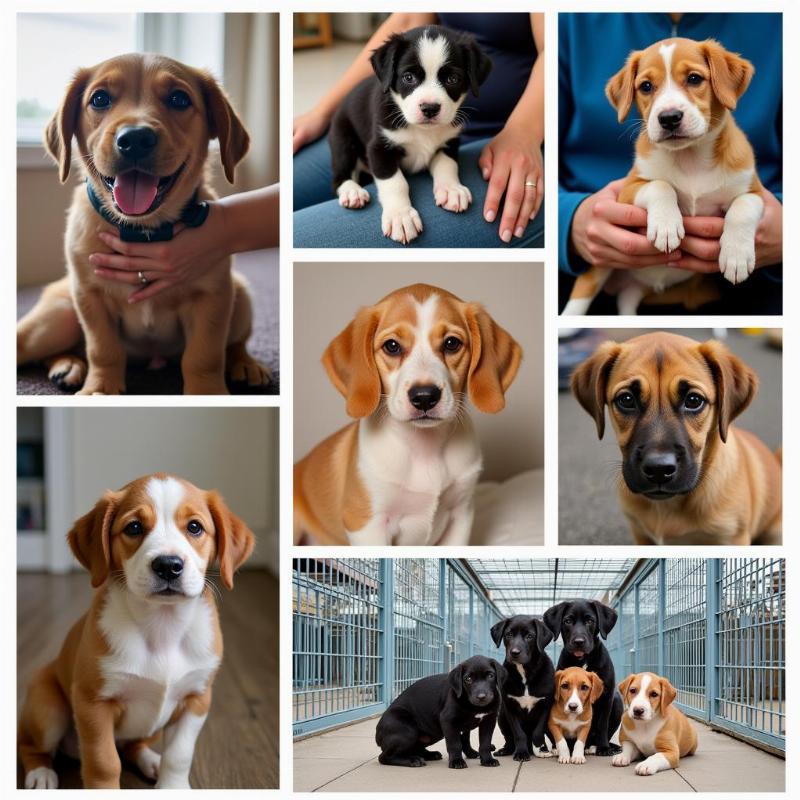“Generation P” in dogs isn’t an officially recognized term like “Millennial” or “Gen Z” for humans. It’s more of a colloquialism used by some breeders and dog owners, particularly online, to refer to puppies born during the COVID-19 pandemic, roughly between March 2020 and the present. This period saw a significant surge in dog adoptions and purchases as people sought companionship during lockdowns and isolation. Understanding the unique circumstances surrounding these “pandemic puppies” can help owners provide the best care and training.
 Pandemic Puppies and Increased Demand
Pandemic Puppies and Increased Demand
Understanding the “P” in Generation P Dogs
While “Generation P” doesn’t denote a specific breed or genetic trait, it does suggest shared experiences. Many Generation P dogs were raised in environments with limited socialization due to stay-at-home orders and social distancing. This could mean fewer interactions with other dogs, people, and various environmental stimuli. Consequently, some of these dogs might exhibit behavioral challenges like separation anxiety, fear of strangers, or reactivity towards other dogs.
Potential Challenges of Generation P Dogs
The limited socialization during crucial developmental periods could lead to behavioral issues in some Generation P dogs. For example, a puppy not exposed to different sounds, sights, and smells might become fearful or anxious in new situations. Similarly, a dog not accustomed to being left alone might develop separation anxiety when their owners return to work or school.
Overcoming Socialization Deficits in Generation P Dogs
Fortunately, many of these behavioral challenges can be addressed through proper training and socialization. Enrolling your dog in puppy classes, gradually exposing them to new environments and situations, and working with a certified professional dog trainer can significantly improve their behavior and well-being. Positive reinforcement training methods, focusing on rewarding desired behaviors, are generally recommended.
Is My Dog a “Generation P” Dog? And Does it Matter?
If your dog was born during the pandemic, they might be considered part of this informal “Generation P.” However, it’s crucial to remember that this label doesn’t define your dog’s personality or potential. While the pandemic upbringing might have presented some unique challenges, every dog is an individual, and with the right approach, any behavioral issues can be managed effectively.
Ensuring a Happy and Healthy Life for Your Generation P Pup
Regardless of when your dog was born, providing a loving, stimulating, and supportive environment is essential for their well-being. This includes providing proper nutrition, regular exercise, mental enrichment, and consistent training. Remember, early socialization and consistent training are crucial for preventing and addressing any behavioral challenges. Don’t hesitate to consult with your veterinarian or a certified dog trainer for personalized guidance.
Conclusion
The term “Generation P” helps highlight the unique circumstances surrounding dogs born during the pandemic. By understanding the potential challenges associated with limited socialization, owners can proactively address these issues and ensure their dogs thrive. Remember, with patience, consistency, and the right resources, you can help your “Generation P” pup, or any dog, live a happy, healthy, and well-adjusted life.
FAQ
- What is the main difference between Generation P dogs and other dogs? The primary difference lies in the potential for socialization deficits due to the pandemic restrictions.
- How can I tell if my Generation P dog has socialization issues? Signs may include fear, anxiety, reactivity, or aggression in new situations or around unfamiliar people or dogs.
- What are the best training methods for Generation P dogs? Positive reinforcement methods focusing on rewards and encouragement are generally recommended.
- Where can I find a certified dog trainer? The American Kennel Club and the Certification Council for Professional Dog Trainers are good resources.
- Is it too late to socialize an adult Generation P dog? It’s never too late! While early socialization is ideal, adult dogs can still learn and adapt with patience and consistency.
- What should I do if my Generation P dog exhibits severe separation anxiety? Consult with your veterinarian or a certified professional dog trainer or behaviorist for tailored guidance.
- Are there any specific breeds more affected by the “Generation P” phenomenon? No, all breeds could be potentially impacted, though individual temperaments and experiences vary greatly.
Beautdogs.us is your premier online resource for comprehensive dog care information, breed-specific guidance, and access to the finest dog products in the USA. Whether you’re a seasoned dog owner or just starting your journey with a new furry friend, Beautdogs.us is committed to providing expert advice and valuable resources to help you navigate the joys and challenges of dog ownership. Contact us today for personalized support and discover the Beautdogs difference! Email: [email protected], Phone: +1 501-555-7529.